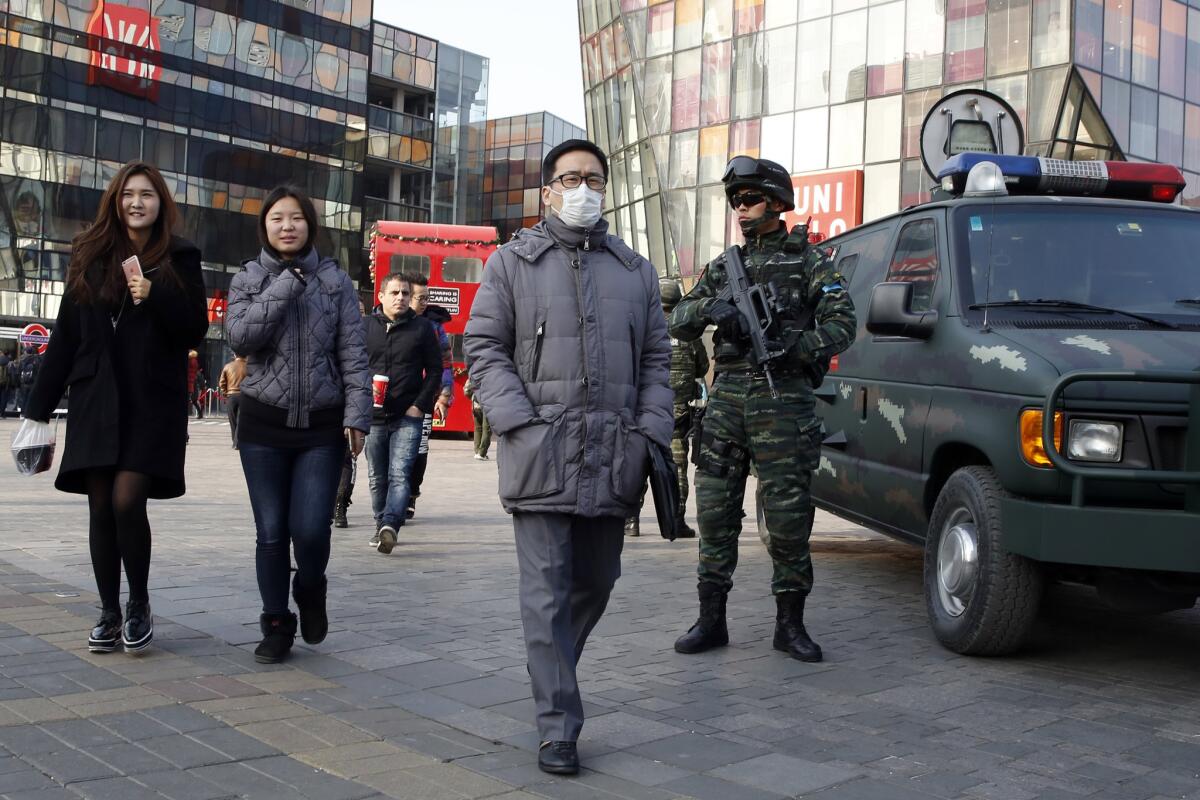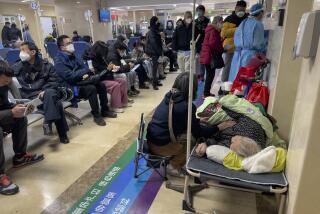Westerners in Beijing warned of Christmas terrorism threat; parts of city locked down

Heavily armed Chinese paramilitary police guard a popular mall in the Sanlitun district of Beijing on Thursday.
- Share via
reporting from BEIJING — The U.S. Embassy in Beijing on Thursday morning warned citizens of a Christmastime terrorism threat against Westerners in one of the city’s most popular expatriate districts.
Beijing authorities put swaths of the city under lockdown, stationing armed guards on street corners and in pedestrian plazas.
“The U.S. Embassy has received information of possible threats against Westerners in the Sanlitun area of Beijing, on or around Christmas Day,” the embassy said in an email to American citizens living in Beijing. “U.S. citizens are urged to exercise heightened vigilance. The U.S. Embassy has issued the same guidance to U.S. government personnel.”
The British, French and Irish embassies also sent similar warnings. None gave further details about the threat.
Yang Shu, a counter-terrorism expert at Lanzhou University in northwest China, said the threat’s high profile and focus on Westerners could mark a first for Beijing. “If you look at previous terrorist threats in the area dating back to the ‘90s, except for one incident in central Asia … no other attacks in China and central Asia have targeted Westerners,” he said.
Sanlitun is one of Beijing’s most fashionable districts, a warren of chic restaurants, bars, cafes and shopping outlets, including China’s first Apple store, which opened in 2008. The area has seen violence before: In August, a Chinese woman was stabbed to death outside a Uniqlo clothing store as she walked with her French husband. Chinese media later reported that the assailant said he “hated Americans” before he attacked.
Join the conversation on Facebook >>
Beijing authorities have issued a yellow security alert — the lowest on a three-tier system — to last through Christmas weekend, according to a statement by the city government’s media office. “As the holiday season approaches, the number of people visiting shopping, entertainment and dining venues will increase remarkably,” said the statement, citing local police. “The Beijing police will spare no efforts to ensure security and order.”
Although China is an officially atheist country, many Chinese consider Christmas a fun cultural diversion, a sort of American analogue to the country’s own Spring Festival. Waiters don Santa hats, hotel lobbies play “Jingle Bells” on repeat, and storefronts hang “Merry Christmas” banners in their window displays.
Yet the threat — and the heavy response — have dimmed the mood in the Chinese capital. They have also caused a stir on the country’s social media sites, with “Sanlitun” becoming one of the top-searched terms on Weibo, China’s version of Twitter, by Thursday afternoon. Some users exhorted Beijingers to exercise caution; others simply posted photos of the heavy security presence.
On Thursday afternoon, Sanlitun was swarming with camouflage-clad guards toting large black rifles. Miles away, another pedestrian shopping street, Wangfujing, was lined with police cars, their lights flashing. Authorities have placed roadblocks in at least one of the city’s embassy districts, limiting both vehicular and pedestrian traffic.
China is struggling with its own domestic terrorism problem in the northwestern region Xinjiang, where violent clashes between ethnic Uighurs — a predominantly Muslim minority group — and majority Han Chinese have become more common in recent years.
The U.K. government has warned citizens of the violence in a travel advisory posted to its website.
“There is a general threat from terrorism [in China], but the risk of attacks is higher in the Xinjiang Uyghur Autonomous region,” it said.
“Although foreigners haven’t been specifically targeted, attacks could occur in places visited by foreigners. You should be particularly vigilant in Xinjiang. Outside of Xinjiang you should be vigilant when transiting public transport hubs, which have been the subject of recent attacks.”
Tommy Yang in The Times’ Beijing bureau contributed to this report.
ALSO
Hospital fire in Saudi Arabia kills 31, injures over 100
After 2 U.S. airstrikes, Afghan official says: ‘Helmand isn’t falling’
Class struggles play out, sometimes violently, on the beaches of Rio
More to Read
Sign up for Essential California
The most important California stories and recommendations in your inbox every morning.
You may occasionally receive promotional content from the Los Angeles Times.













